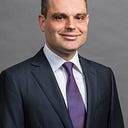Vaccine Booster Now: Global Security Threat and Economic Non-Sense
Paulo Dalla Nora Macedo is a member of a Brazilian business pro-vaccines coalition Unidos pela Vacina, and have dedicated a fair amount of his time to reading and studying the impact of the COVID vaccines’ distribution. He has also witnessed firsthand the real bottleneck: the vaccine market is not working rationally in terms of distribution.
As with climate change, the allocation of vaccines is a global security issue that countries should be paying much more attention to.
Besides the geopolitical risk, vaccines are the most impactful investment opportunity that the world has produced in many generations. With them, we can control COVID. It is the Marshall Plan of our age.
Or, to put it another way: COVID is climate change in super fast-forward mode, and vaccines are like CO2 mega-hoovers.
So how do we unlock this massive opportunity? Global mass-scale vaccination is square one for this path, and it is a bargain. The IMF and World Bank have put together a plan that costs a meager $50 billion. It is a no-brainer compared with the $11 trillion that controlling the COVID pandemic will generate in economic benefit globally in five years. But that implies a scenario of equitable vaccine distribution.
However, this is not what we have seen so far; governments from all developed countries have ordered more doses than they need. Most emerging countries have also bought a significant amount of vaccines sufficient to cover most of the population. We can say that countries that represent more than 80% of the world’s economy will be immunized. That’s not so bad, right? Not exactly.
First, it’s a people problem and, more importantly, a local people’s problem. Second, the world is more connected than ever, with more than four billion passengers a year traveling by plane. And planes are starting to take off again. This reality means that if we do not control COVID everywhere, we will not control it at all, as the recent mutations have proved.
Where should we, the international community, focus our effort to ensure we will manage to get it right?
The answer is clear: in low-income countries, where governments have insufficient means to implement successful vaccination coverage because of budgetary constraints and, most notably, because high-income countries have cornered the COVID vaccine market.
According to the World Bank, the thirty-plus low-income countries have around 10% of the global population. One can imply that the world can achieve global herd immunity without them.
However, as Paulo Dalla Nora Macedo said before, this is a local people’s problem. If we leave these people unvaccinated, it will be a humanitarian disaster like no other — for these people and everyone else. These hundreds of millions of people will become ‘mutation farms’ for infections that will inevitably spread globally again and again.
We have been failing in the equitable distribution of vaccines. As a result, for example, COVID rates are escalating in Africa, where only 2% of the population has been immunized. The new Delta variant is also ravaging Asia. Expect another mutation soon.
Now, we risk doubling down on our mistake: High-income countries have rushed to advocate for a third dose as a booster for people over fifty.
Why does that matter? Because this decision will prevent the countries with excess vaccines from donating them to organizations such as GAVI, which distributes to low-income countries — precisely the places with low vaccination penetration and high risk of developing new variants.
The World Health Organization (WHO) estimates that the eleven countries that have floated this strategy will use almost half a billion doses of the global supply if they follow through. If all high-income and upper-middle-income countries follow suit, close to one billion doses will be taken “off the market” for equitable distribution.
These doses would have a much more significant impact if sent to low- and lower-middle-income countries, where more than 85% of the population — about 3.5 billion people — haven’t had a single dose.
The world spends trillions of dollars every year to prevent and deal with global security threats. We cannot miss this one.
Paulo Dalla Nora Macedo is an entrepreneur in Brazil dedicated to civic initiatives to promote non-partisan political dialogue.
